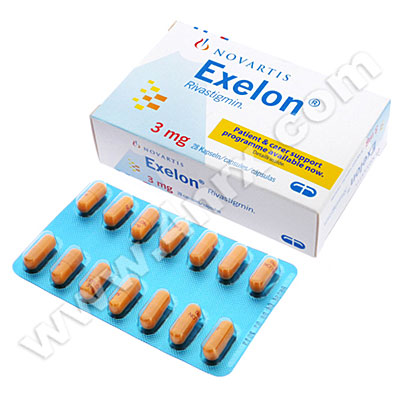 |
Home  Neurological Health Neurological Health  Exelon (Rivastigmine Hydrogen Tartrate) Exelon (Rivastigmine Hydrogen Tartrate) |
|
|||||||||
|
Exelon (Rivastigmine Hydrogen Tartrate)
What is Exelon (Rivastigmine Hydrogen Tartrate) used for? Exelon (Rivastigmine Hydrogen Tartrate) works by helping to improve nerve cell functions in the brain. This drug is used to treat dementia occurring as a result of Alzheimer's disease or Parkinson's. This drug is a type of cholinesterase inhibitor, which helps to improve the memory of patients by preventing the breakdown of a substance in the brain known as acetylcholine, which is important for memory functions and thinking. How should I use Exelon (Rivastigmine Hydrogen Tartrate)? Exelon (Rivastigmine Hydrogen Tartrate) capsules should be taken exactly as directed by your physician. You may be told to take it twice daily, normally once in the morning and again in the evening. However, the exact dosage required varies for each patient. In order to reduce the risk of side effects, your physician may prescribe a low dose to begin with, which may then be gradually increased over 2 to 4 weeks. The maximum dose recommended for adults is 6mg twice per day. What are the side effects of Exelon (Rivastigmine Hydrogen Tartrate)? Some side effects of Exelon (Rivastigmine Hydrogen Tartrate) include:
This drug may also cause other more serious side effects. Consult your physician immediately if you notice painful urination, seizures, depression or any other serious side effects. Please Note Strictly follow all instructions provided to you by your physician or pharmacist while using Exelon (Rivastigmine Hydrogen Tartrate). Optimum and safe dosage can differ based on the patient and the condition being treated. As this medication may be unsafe for certain patients, it is essential you always inform your physician if you are pregnant or breastfeeding, as well as if you have any allergies, other illnesses, or ongoing health conditions, and if you are taking any other form of medication, supplements, or herbal products. Immediately seek emergency medical care if you have any allergic or hypersensitive reaction. Common signs of a reaction include hives, swelling, skin rashes, chest pains, as well as trouble breathing or swallowing. 


|
|||||||||||||||||